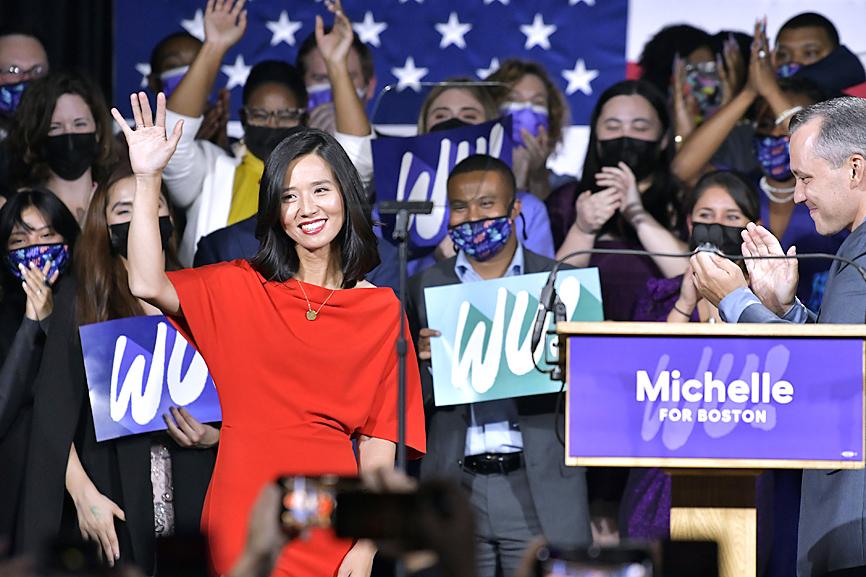Taiwanese-American Michelle Wu (吳弭) on Tuesday made history after winning the mayoral race in Boston, becoming the city’s first woman and Asian American elected to the post.
The 36-year-old daughter of Taiwanese immigrants won nearly 64 percent of the vote in her race against fellow Boston City Councilor Annissa Essaibi George.
“On this day, Boston elected your mom because from every corner of our city Boston has spoken,” Wu said in her election night speech. “We are ready to meet this moment. We are ready to become a Boston for everyone.”

Photo: AP
Wu, a progressive Democrat, ran on policies such as affordable housing, police reform, closing the racial wealth gap and a city-level Green New Deal.
Wu was born and grew up in Chicago, Illinois. She later moved to Boston to study at Harvard University and graduated from Harvard Law School in 2012.
That same year, Wu worked on US Senator Elizabeth Warren’s first campaign for the US Senate after having been a student of Warren’s in law school.
Wu, who in 2013 became the first Asian-American woman elected to the Boston City Council, served three terms on the council.
From 2016 to 2018, she served as council president, the first minority person to hold the role.
In past interviews with US media, Wu has shared the struggles she faced in her early 20s taking care of her mother, who has a severe mental illness, and raising her two younger sisters.
On her campaign Web site, Wu says that her family’s struggles showed her how much government matters and propelled her into law school, activism and, later, a political career.
“She basically helped raised her two sisters and took care of her mother by herself, so I really commend her for her tenacity,” said Wilson Lee, a fifth-generation Chinese American and Boston resident. “She really represents the aspiration, the hope, for all immigrants.”

WAITING GAME: The US has so far only offered a ‘best rate tariff,’ which officials assume is about 15 percent, the same as Japan, a person familiar with the matter said Taiwan and the US have completed “technical consultations” regarding tariffs and a finalized rate is expected to be released soon, Executive Yuan spokeswoman Michelle Lee (李慧芝) told a news conference yesterday, as a 90-day pause on US President Donald Trump’s “reciprocal” tariffs is set to expire today. The two countries have reached a “certain degree of consensus” on issues such as tariffs, nontariff trade barriers, trade facilitation, supply chain resilience and economic security, Lee said. They also discussed opportunities for cooperation, investment and procurement, she said. A joint statement is still being negotiated and would be released once the US government has made

NEW GEAR: On top of the new Tien Kung IV air defense missiles, the military is expected to place orders for a new combat vehicle next year for delivery in 2028 Mass production of Tien Kung IV (Sky Bow IV) missiles is expected to start next year, with plans to order 122 pods, the Ministry of National Defense’s (MND) latest list of regulated military material showed. The document said that the armed forces would obtain 46 pods of the air defense missiles next year and 76 pods the year after that. The Tien Kung IV is designed to intercept cruise missiles and ballistic missiles to an altitude of 70km, compared with the 60km maximum altitude achieved by the Missile Segment Enhancement variant of PAC-3 systems. A defense source said yesterday that the number of

‘CRUDE’: The potential countermeasure is in response to South Africa renaming Taiwan’s representative offices and the insistence that it move out of Pretoria Taiwan is considering banning exports of semiconductors to South Africa after the latter unilaterally downgraded and changed the names of Taiwan’s two representative offices, the Ministry of Foreign Affairs (MOFA) said yesterday. On Monday last week, the South African Department of International Relations and Cooperation unilaterally released a statement saying that, as of April 1, the Taipei Liaison Offices in Pretoria and Cape Town had been renamed the “Taipei Commercial Office in Johannesburg” and the “Taipei Commercial Office in Cape Town.” Citing UN General Assembly Resolution 2758, it said that South Africa “recognizes the People’s Republic of China (PRC) as the sole

Taiwanese exports to the US are to be subject to a 20 percent tariff starting on Thursday next week, according to an executive order signed by US President Donald Trump yesterday. The 20 percent levy was the same as the tariffs imposed on Vietnam, Sri Lanka and Bangladesh by Trump. It was higher than the tariffs imposed on Japan, South Korea and the EU (15 percent), as well as those on the Philippines (19 percent). A Taiwan official with knowledge of the matter said it is a "phased" tariff rate, and negotiations would continue. "Once negotiations conclude, Taiwan will obtain a better